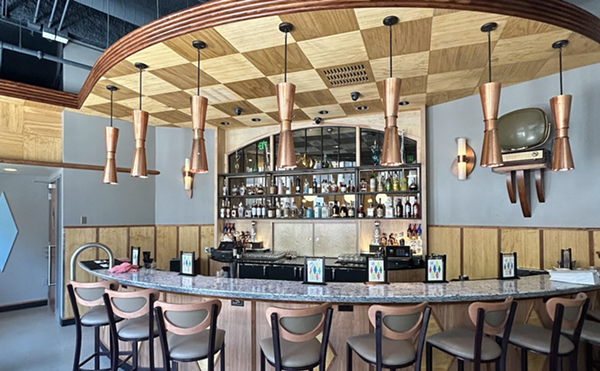By Christin Lee
In the beginning I thought with some relief: I will no longer have to have friends. The man I loved had some version of this thought, too. The day that everything became untouchable, my courage took the form of visiting three grocers for chicken. Suddenly everything was under a slip of disease. WIPE DOWN YOUR PHONE, my friend messaged, it's 10 times dirtier than a toilet seat. The man didn't come to dinner that night. The next day he told me that his mother was sick, and there were many things that were important to him. On this invisible list he kept in his head, he told me I was last. Everything else was so pressing that he only managed to post one photo on his Bumble profile that day.
There was a morning I looked out my window to the Lodge and nothing moved. For long stretches of time, the valley was empty and silent. The groundhog was in no hurry to scuttle across the yard. I noticed that I was waiting, like I was seated for a test. I guessed an answer: Americans drive out to the quiet, it isn't supposed to come for us.
Strange reports registered on the body. A rash across the arm, an ache under the skin that roved like a ghost in your house, frantic and eternally tethered. My eyes hurt, they just hurt, from trying to understand too much. In the mornings I sat in a soft wingback chair and read every news item through to the last sentence. I read medical journals and comprehended nothing. No exceptions, I thought, now this is your holy work.
One day I saw a woman I knew waiting outside the grocer's. She was a writer, married with young kids. When she picked apples on the other side of the citrus island, mask tight, I looked at her to say hello. I sensed she kept her eyes down deliberately. Her body was tense and I understood. The rules were different now. I could see that our suffering would remain separate, and I could feel a new logic of emergency taking hold.
Another day, I cradled my phone. One more emergency resolved, house quiet. I'd stopped taking amphetamines in the morning. I wanted a truce with slowness. Gone were the litanies I'd recited to myself, gone was any bitterness, the soft music of my fears and slights against me. For the moment, each intimate friend was safe, housed, fed. I was overcome with love. I felt the gold dust of serenity settle over me, but then the future went slack. There was still a frantic animal in me panting at the door. Thoughtlessly, from bottom to top, I licked the smooth black screen of my iPhone.
I tried to understand why I loved the man so much. It had to do with seeing. I had come to believe that everything I saw in the world, he saw too. Two eyes collapsing into one field of vision, making everything deeper, sharper. There was great happiness; I had never known this kind of trust.
Washing dishes with the news on, I looked down from my kitchen window to see a boy playing in Bob Sestok's sculpture park. Cicadas made their jazz, and Bob's welding buzzed along in the middle of the morning. The boy was absorbed in some fantastic, invisible world. He had chosen the tallest sculpture in the park to be his enemy. He was ecstatic and guileless with some stick or sword. I watched him stab and retreat until he would fall to the ground, wounded, defeated, dead. Then he would jump up, circle, stab, and fall victim to the towering assemblage again. I felt convicted by a bad metaphor. Everyday I wear myself out on the unchangeable. I thought, hey kiddo. You and me, why do we issue ourselves so many defeats?
The season grew warmer. The anguish ... for now there's no writing it down. If you put your hand on your chest, you can still feel it. You could rake and dig and water, but the anguish was the only thing that grew.
The more I saw my friends in squares, the more frightened of them I became. Two inches by two inches. All that flitting by. Was it that I knew them to be so much bigger? Did seeing them miniaturized disorient me? I lost my talent for touch. I slept in the shape of a cannonball.
On the Fourth of July, my dad called me as our small party devoured the bread, salad, potatoes, and lamb. We passed the shrooms. I excused myself and walked into an empty side lot. I paced the perimeter of the chain link fence as we spoke and slung my tears away from my chin. The house party down the street smelled like hickory smoke and sugar. The fireworks were deafening like war. When I came back to the picnic table someone asked, Do you guys talk very often? No, I said, I thought he was calling to tell me he was dying or something, but he just wanted to tell me that he loved me and he was sorry the past between us was so hard.
The next day I drove to Belle Isle. On the bridge I saw a man sitting on the roof of a Tahoe, legs dangling through the sunroof. The car went faster and faster as he punched the sky, joyful and alive, riding his catharsis like a chariot into the sun. I met my friend at the beach when the shadows were going long, the crescent bellies had burned, and heads lolled back on lawn chairs. She waded into the water and laughed to brace against the cold. A boy drifted toward us on a pool noodle. He wanted to know our names. Hello, we said. More children came, pushing my friend to the periphery as I stood in the middle and tried to keep up with their questions. It was six conversations at once. One boy was five, one boy was six, one girl was seven, two girls were eight. It's your birthday? Happy birthday! How long have you been swimming? I see why you think Spiderman is the best, but I disagree. No, I'm much older than that. Do you know how to float? I crouched down with the water at my shoulders while my friend waved to the mothers on shore. Did they want us to play? It seemed all was well, the children could stay in the water. The girls drifted off and I pulled the boys back and forth on the noodle. Let me show you something, I said. I'll teach you how to float. Both boys shivered in the water. I opened my palm and the youngest fell back and stretched his arms out, eyes big and trained on the sky, blinking. I've got you, can you hear me? Yes. Do you hear the river? Yes. What does it sound like? He laughed, I don't know! Arch your back, chin up, relax. The small of his back grew lighter on my fingertips. You're doing so well, do you want to keep floating? Yes, he said. He closed his eyes. I was grateful for what touch can't say: I wanted a child so badly, but the right man never came. For the hour, the gods of shame and violence looked away, and the sky gathered its purple clouds around us. We all swam under small, evaporating lights.
Christin Lee, director and founder of Room Project in Detroit, received her MFA in fiction from the University of Michigan.





